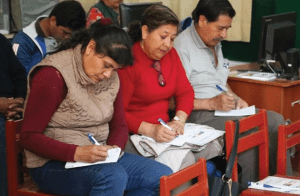At Mary MacKillop Today, we believe education doesn’t just happen within the classroom, but also in the home and within the community.
Positive parental engagement in formal learning gives students the best possible chance at succeeding at school and achieving brighter futures. Yet, in rural areas of Peru, parents are less likely to be involved in their children’s education, which can impede a child’s ability to finish their schooling and realise their full potential.
 In partnership with local organisation, Centro de Educación, Organización y Promoción del Desarrollo de Ilo (Centre for Education, Organisation and the Promotion of Development, Ilo), we take an holistic approach to enhancing parental involvement in education. This means training teachers, students, and parents on how to involve the whole family in children’s education to create better outcomes for student development.
In partnership with local organisation, Centro de Educación, Organización y Promoción del Desarrollo de Ilo (Centre for Education, Organisation and the Promotion of Development, Ilo), we take an holistic approach to enhancing parental involvement in education. This means training teachers, students, and parents on how to involve the whole family in children’s education to create better outcomes for student development.
Thanks to the generosity of supporters, our workshops assist teachers and parents to play an effective role in their children’s education. To date, we have run workshops for 86 teachers across 7 schools in Peru on how to strengthen the relationships between family, community, and teachers. These workshops have supported 600 parents to take an active role in their children’s learning.
Hear how the parent education initiative has helped this school in Peru!
“The parents education project that has been implemented in our school is strengthening the capacities of teachers and tutors especially, through training and through reflections on the communication that we have with them. I have seen that they are able to respond and act in a more articulated way, more in communication with the parents, which is what we want. This is very important for students and their development as well.
Our teachers and tutors have also acquired the appropriate tools to intervene in cases of children who are at risk and how to guide them. We can also see that our students are being strengthened. We know that at the regional level there are many schools that are reporting stress in their students, and we are aware of this in our school.
Thankfully, with this project, we are doing well with the interventions of the teachers and the talks that are made to them. We try to emotionally support the students in these situations so that they also feel strengthened and more resilient. Parents are responding well too. They are supporting their children a lot, thanks to the communication we have with them. We are also articulating actions with the health centres, women’s centres, and mainly with the mental health centre, which we have a very great relationship with.”
– Hugo Castillo Rojas, Director of Mariscal Domingo Nieto School, Peru








